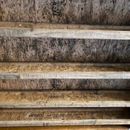Mold Remediation and Prevention
This is not strictly a green building issue, but hopefully some of the experts on this board might be able to provide some advice.
I’m the architect for a new residence under construction on Martha’s Vineyard, Zone 5. During an inspection this week, it was apparent that over the course of the previous week or two, mold had formed on the framing and floor deck over a portion of the basement. This portion was in a section where the floor deck had been exposed to the elements for several winter months. The contractor has installed some fans and is keeping the deck dry. They have also engaged ServPro, a national cleanup and restoration company to come in and provide a plan for mold remediation.
One complicating factor is that our client is extremely sensitive to allergens and a variety of air born chemicals. Does anyone have any suggestions on the best path forward, or just as importantly, what not to do? See photo attached.
Thanks
GBA Detail Library
A collection of one thousand construction details organized by climate and house part










Replies
I would dehumidify the basement, and once the wood product are dried out, spray everything with a high quality primer. You could pretreat the area with something like concobrium as well.
Thanks for the input...I'll check our concobrium.
When mold grows on a porous surface it grows into the interior and you have to seal the surface to keep spores from spreading. Paint or primer should do it. The mold remediation company should be up on this, it's kind of what they do.
I'm familiar with the climate where you are and it's very challenging from a building science perspective. Summers are so cool that it's rare to have air conditioning but it's very humid. I've seen fog so thick it set off smoke detectors indoors. Mildew will grow on any surface that condensation forms on, and when dew points are in the 70's, that's any surface. I've seen mold on plastic, stone, concrete and even glass. The only way to keep condensation from forming is to seal and insulate the house, and condition the air inside, which usually means dehumidification only. All of which kind of defeats the purpose of living in an oceanside paradise where the climate is so mild you can keep the windows open from May to October.
The humidity means that walls have a harder than normal time drying. This means that any water intrusions have an exaggerated impact. That area regularly receives storms with 50+ mph winds, and nor'easters that drop snow on the rest of the region often drop rain on the coast. It's really common for wall assemblies that are fine elsewhere to leak.
All of this is exacerbated if the house is only occupied in the summer. When the heat is run in the winter there is vapor drive that allows the walls to dry to the exterior. Typically houses in New England are built to dry to the exterior and won't dry during the summer when the outside is damper than the inside. You count on a winter heating season to dry out all of the moisture that accumulates during the summer. Without a heating season you never dry.
Next we can talk about doors that swell so much that they won't close in the summer and won't seal in the winter!
Thanks for the input...This home will be occupied year round so we will have winter heating.
Given that this mold seems to be very much on the surface and formed in a very short period of time, I would hope that removal only would be sufficient without need to seal the surface but will check with mold remediation company in any case.
Usually the remediation people will treat the mold with what is basically a bleach solution to kill it. In extreme cases, they will sandblast first. Either way, if you want some extra protection for your client, apply a serious primer like BIN to act as an encapsulant to prevent any possible release of mold spores. I would apply the primer with a sprayer so that it gets into everything to avoid missing any spots.
The mold probably occured due to conditions that kept things moist and warm enough. Once those conditions go away, the mold problem shouldn't recur.
Bill
Bleach is never a good idea with mold. Hopefully they use a fungicide. Dry ice treatment is a great option too. It is a blasting technique that has really easy cleanup.
This guy is very good and cleans up many buildings under construction. Michael Rubino
https://www.allamericanrestoration.com/about/
Licensed in Connecticut, New Jersey, New York, & Pennsylvania, with Offices in New Jersey & Florida CMRS Certified, Certified Microbial Remediation Supervisor, Certified Member of IAQA, IICRC, ACAC, & A+ Rating BBB
He recommends Benefect Decon 30, but technique is just as important as product.
Trust the Hypersensitive Mold Remediation Experts
Sorry to hear about the mold situation on your Martha's Vineyard project. That's a tricky spot, especially with the client's sensitivity. Good call on getting ServPro involved.
As for suggestions, besides what you're already doing, maybe consider adding a dehumidifier to keep the moisture levels in check. Also, ensure proper ventilation in the basement area. Since your client is sensitive, maybe opt for natural, non-chemical solutions for mold removal to avoid any additional irritants. I went through a similar situation with a project in Houston, and we had to be super careful about allergens too. It's a bit of a headache, but it's doable. Also, I've heard about this Mold Removal & Inspection Company in Houston, TX https://www.alldryus.com/texas/houston-mold-remediation/ , they might have some useful tips or resources for your specific case. They usually know their stuff.